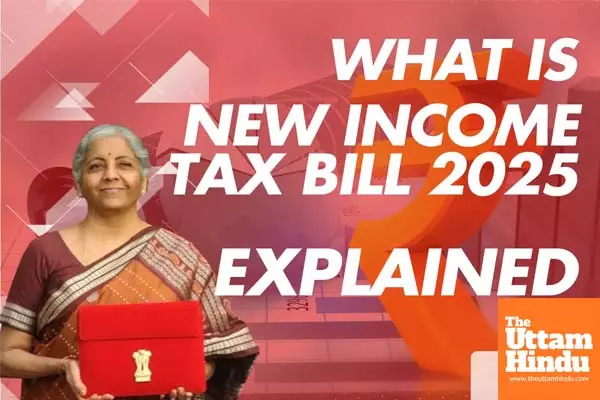
New Tax Bill to Be Tabled Today: Here’s What It Means for You in 10 Points

New Delhi (The Uttam Hindu): The budget session of Parliament is underway, and today, the government is set to introduce the New Income Tax Bill 2025 in the Lok Sabha, replacing the Income Tax Act of 1961. This marks a significant overhaul of the tax system after 63 years. The draft of the bill, released on Wednesday ahead of its presentation, highlights various changes aimed at making taxation simpler, more transparent, and taxpayer-friendly. The proposed reforms focus on digitization, streamlining tax payments, and stricter measures against tax evasion.
Key Highlights of the New Income Tax Bill 2025
1. The new tax bill has been drafted in a way that is easier for the common taxpayer to understand. The original 1961 Act had 880 pages, whereas the new bill has been condensed to 622 pages. It now consists of 536 sections and 23 chapters, making it more structured and reader-friendly.
2. The bill introduces the concept of a 'Tax Year', replacing the previously used Assessment Year and Previous Year. This change is expected to reduce confusion among taxpayers. For instance, the tax year from April 1, 2025, to March 31, 2026, will be called 2025-26, covering the full financial year.
3. The standard deduction remains ₹50,000 under the old tax regime but increases to ₹75,000 under the new regime. The tax slabs remain unchanged:
- Income up to ₹4 lakh – No tax
- ₹4 lakh – ₹8 lakh – 5% tax
- ₹8 lakh – ₹12 lakh – 10% tax
- ₹12 lakh – ₹16 lakh – 15% tax
- ₹16 lakh – ₹20 lakh – 20% tax
4. The Central Board of Direct Taxes (CBDT) now has the authority to independently introduce tax schemes without seeking parliamentary approval, reducing bureaucratic delays.
5. The capital gains tax structure remains unchanged. Short-term capital gains (STCG) remain at 20% for holdings under 12 months, while long-term capital gains (LTCG) will be taxed at 12.5%.
6. Tax deductions on pension, NPS contributions, and insurance remain unchanged. Retirement funds, gratuity, and PF contributions are also tax-exempt. Investments in ELSS mutual funds continue to receive tax benefits.
7. Tax evasion will now attract higher penalties and legal prosecution. Concealing income can lead to account seizures, and providing false or incomplete financial details will result in hefty fines.
8. The bill emphasizes digitalization by making e-KYC and online tax payments mandatory. E-filing will be compulsory to ensure transparency in tax compliance.
9. Agricultural income remains tax-free under specific conditions. Religious trusts, institutions, and donations continue to enjoy tax exemptions. Electoral trusts will also be tax-exempt.
10. The simplified language and clear provisions aim to reduce litigation and tax-related disputes. By eliminating ambiguities present in the 1961 Act, the new bill is expected to create a more efficient tax administration system.
The introduction of the Income Tax Bill 2025 is a significant step toward modernizing India's tax framework, promoting ease of compliance, and ensuring a fair and transparent taxation system for all.

